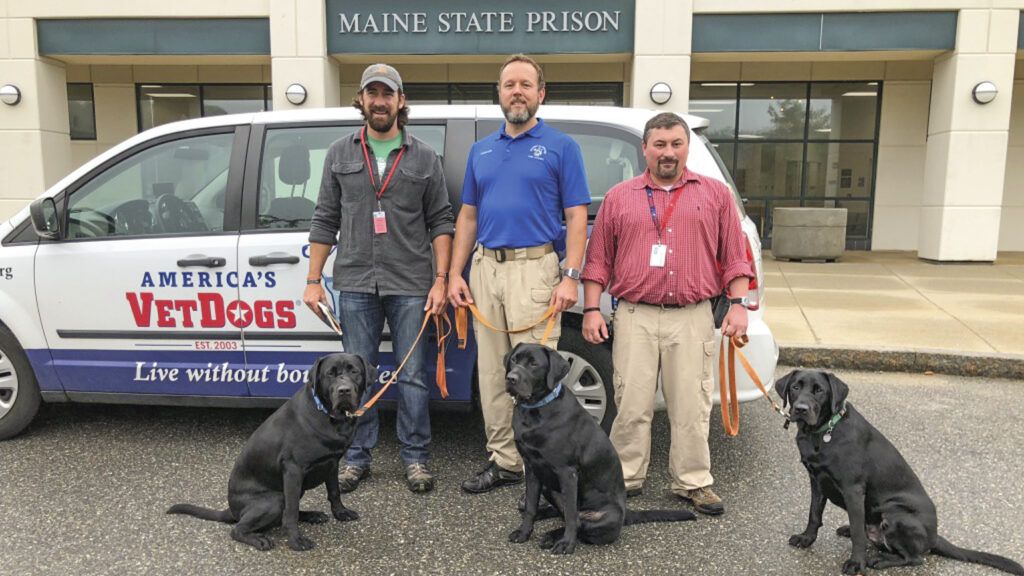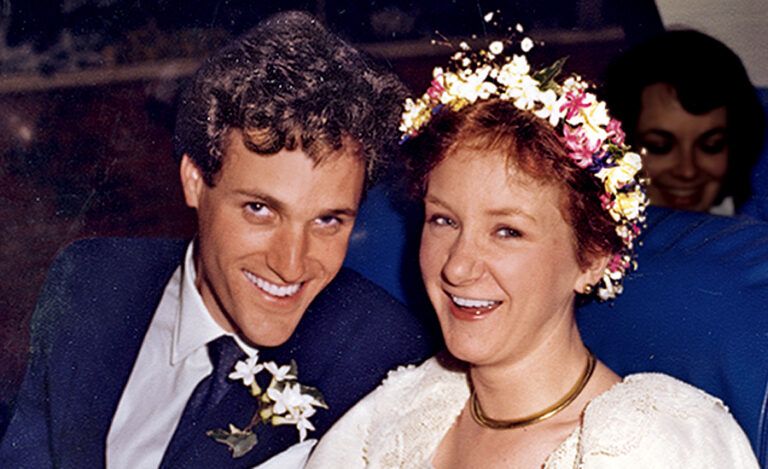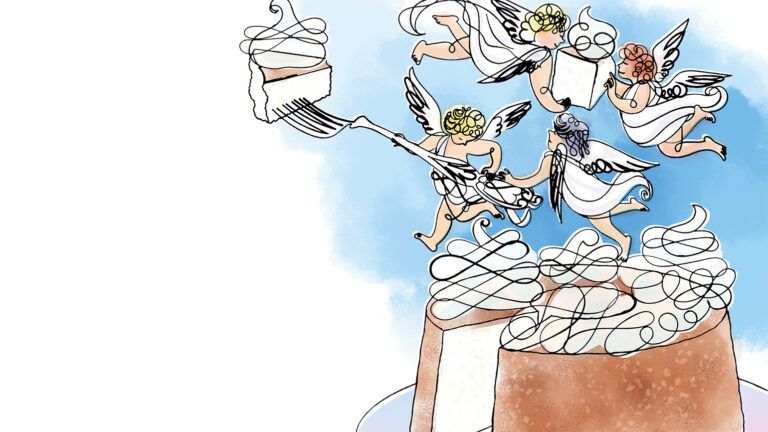My security escort met me in the lobby of the Maine State Prison and led me to the visitation room. The large wide-open space with high ceilings and a carpeted floor held none of the sounds or smells of life behind bars, a world I knew too well from my time as a military prison guard. And yet I couldn’t help but feel on edge. For years I’d told myself I wanted nothing more to do with prisons or prisoners ever again. Now here I was a guest at the biggest lockup in the state, a two-hour drive from my home.
A dozen or so other visitors shifted restlessly in folding chairs facing the front of the room. Four inmates in white T-shirts and jeans, all of them veterans, sat in the very first row, each with a black Labrador at his feet.
The dogs were the main reason I was here. For the past 15 months, these inmates had been training the Labs to become service dogs for veterans on the outside. The prison program was co-sponsored by an organization called America’s VetDogs, and a representative had come out to “graduate” Chess, the first dog to pass all the requirements under the guidance of his trainer, Michael Kidd. Chess was ready to be of service to a veteran who suffered with PTSD.
I had a dog at home myself, a goofy-looking mutt named Fred, rescued from Afghanistan during my deployment eight years earlier. The story of how I smuggled Fred back to the States made headlines around the world. The prison warden had heard about the book I’d written and invited me to see the program as a fellow veteran. An interesting way to spend an afternoon, I figured. Nothing more. I hadn’t stopped to think that my memories would be coming with me.
Before I joined the Marines, I’d mostly avoided taking on any kind of responsibility. I couldn’t seem to find my place in the world. I’d hoped the military would demand something more of me and help me figure out what God had planned for my life. But I was assigned to the military police, working in prisons in South Carolina and Guantanamo Bay—a difficult, dehumanizing experience. I found myself looking down on the prisoners, begrudging anything that brought them the least bit of pleasure. In my mind, these vets were criminals and needed to be constantly reminded of it. After four long years I was finally able to transfer into the intelligence division, where I remained until I finished eight years of service. I hoped I’d grown less judgmental since then, but looking out at the men in the first row, I couldn’t say that was true.
The woman from America’s VetDogs walked to the podium to address the prisoners. “I’m extremely proud of these dogs and the work you’ve done with them,” she said. When she called Michael Kidd to the stage, Chess followed obediently at his heel.
“Chess came here as a rambunctious puppy,” the woman said to Michael, “and you have molded him into a highly trained companion with a commitment that would test the patience of the most experienced trainer.” Chess sat patiently beside Michael, calm and attentive. Fred would have been sniffing all over the room by now. I couldn’t imagine the work involved in training a dog to this level.
The woman knelt and slipped the official yellow vest, stitched with the words SERVICE DOG in bright red, over Chess’s head. Everyone stood and applauded the accomplishments of Chess and his trainer. But I imagined it was a bittersweet moment for Michael. He’d have to say goodbye to Chess.
Afterward I walked over to the two of them, Michael sitting on the floor with Chess between his legs, rubbing the dog’s big black ears. “What will you miss the most?” I asked.
“Having somebody that doesn’t judge you,” he said. “Chess just wants love and to give love.”
Again I thought about my judgmental attitude and the unease I’d felt upon seeing these men here today. A dog didn’t see people that way. I had so many more questions for Michael, but there wasn’t time.
He gave Chess a final hug, then handed over his leash and turned away, escorted with the other inmates back to their cells. I remembered how hard it had been for me to put Fred on a plane home to the States, where he would await my return at the end of my deployment. I missed him every minute, even though I knew we would be reunited. Michael would probably never see Chess again.
As I was leaving the prison, I asked the warden if I could meet with these inmates again to learn more about them and their work. He set up a meeting in one of the prison classrooms.
This time I brought Fred. He bounded about the group, bridging the initial awkwardness. Talking about Fred and what he meant in my life led to the prisoners talking about what the training relationships meant to them. The fulfillment it gave them. The sense of purpose such a commitment instilled. The unconditional love from their charges. Michael was so proud of what he’d accomplished with Chess. “Maybe you should put it down in words,” I told Michael. “Writing about Fred was such a release for me.”
“Maybe,” he said. I hoped I hadn’t overstepped. Writing wasn’t for everybody, so I was surprised when I received an email from a prison administrator who forwarded a lengthy, heartfelt letter Michael had written to me.
Michael talked about losing his father to cancer when he was 14. His decision to join the Army and the difficulties he had upon his return to civilian life. Becoming addicted to pills and robbing to support his habit. Receiving a 15-year prison sentence at age 22. Then how on Father’s Day he’d given his life to Christ. And how when the opportunity came to work with Chess it had felt meant to be. “Training Chess has given me purpose, helping a soldier I may never meet, someone struggling with feelings of isolation. Just like me.”
Just like me. The words resonated. These men were much more than the white T-shirts and jeans that had made me uneasy. Moreover, they were making a difference, even while they were locked away. Was there some difference I could make for them in return? I offered the only thing I could think of—writing and storytelling instruction at the prison. The warden was receptive to the idea.
Once a week I drove to the prison for the Purposeful Tails Writing Group. I brought Fred as often as possible, but we stretched our focus beyond the interest in dogs that had initially brought us together. I assigned the men a topic for each class, where they would read their work for all of us to discuss: a time when they received an act of kindness, a letter to their younger self, family strife, the temptation of alcohol and drugs. I was surprised by the depth of their responses and how freely they shared their emotions. Vets could be reluctant to do that.
On occasion I had the opportunity to see them in training sessions with the dogs, their watchful guardians, their messengers of hope and reassurance, with blessings that stretched far beyond the Maine State Prison walls to veterans all across the country. In time, I no longer saw the men as criminals but as thoughtful, caring men who had served their country, just as I had, even if they had made mistakes in the aftermath. We all wanted the same thing in the end—to feel like our lives matter. Training the dogs and telling our stories helped make that so.
I became convinced that my time at the Maine State Prison was no accident. Those inmates gave me a chance to redeem myself and leave behind my judgmental attitudes from the past. I’d seen God at work “on the inside,” showing that he loves each and every one of us, all worthy of a second chance. It seemed fitting that I got mine in prison.
For more angelic stories, subscribe to Angels on Earth magazine.






